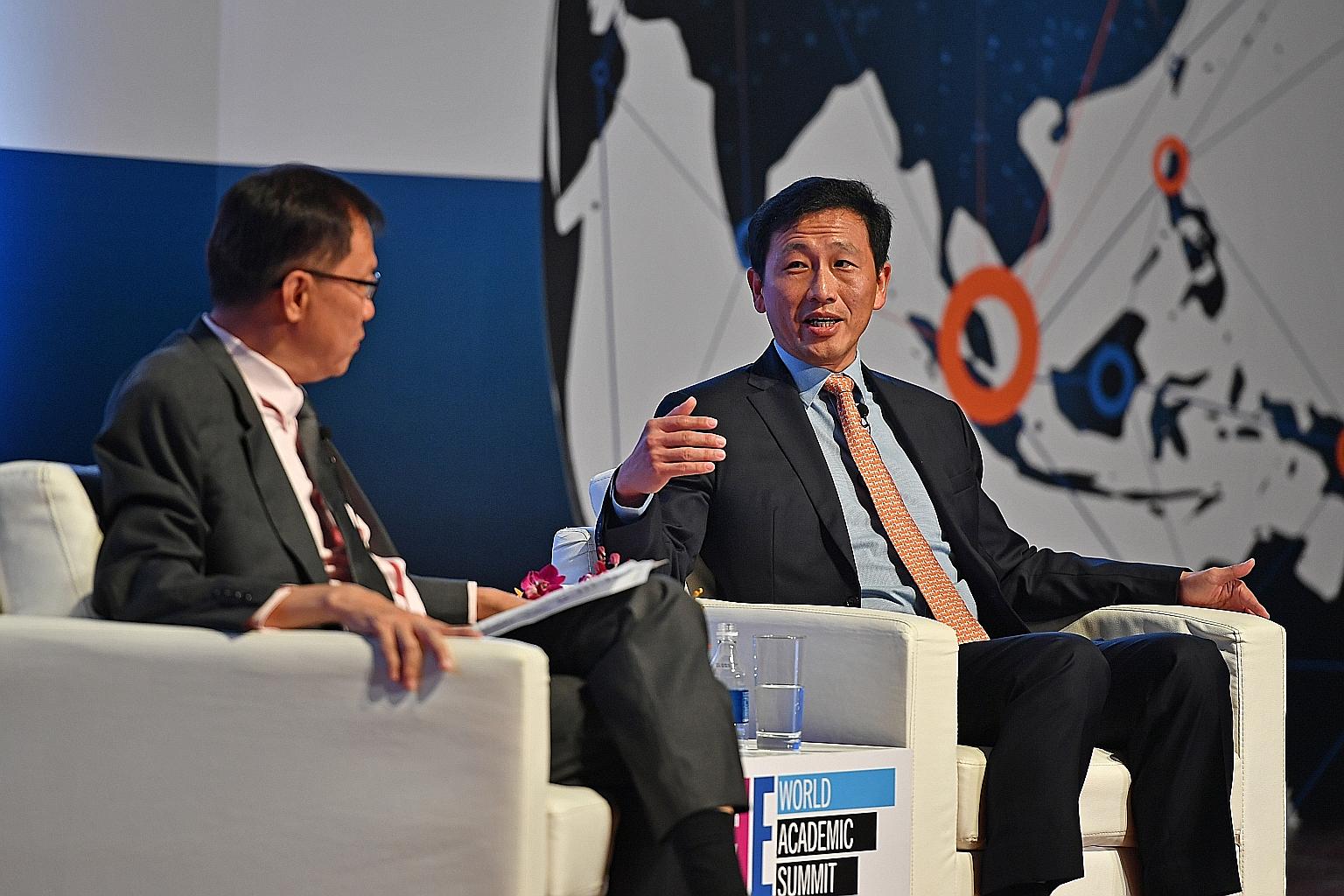Rankings need to evolve and evaluate wider impact of unis: Ong Ye Kung
Sign up now: Get tips on how to help your child succeed

Global rankings need to go beyond just publications and citations, said Education Minister Ong Ye Kung, seen here with Professor Ho Teck Hua, who chaired a dialogue session at an education summit at NUS yesterday.
ST PHOTO: CHONG JUN LIANG
With universities going through deep changes to keep pace with disruption - from the way they teach to the research they do - how they are ranked also needs to evolve.
Rankings need to go beyond just publications and citations, and instead take into account how a university works with industries, communities and government, and improves these areas.
Education Minister Ong Ye Kung made this call yesterday at an education summit at the National University of Singapore (NUS) that was organised by Times Higher Education, which publishes one of the world's most recognised university rankings.
"If there is a change I wish for... it will be to evaluate the effectiveness of a university in collaborating with the world outside of academia - industries, society, communities, government - and delivering impact in all these sectors. This will go way beyond publications and citations, which are the easiest to measure today and we may have relied on quite a lot."
He explained this was also the view of the International Academic Advisory Panel (IAAP), comprising university leaders and chief executives of global companies, that met in Singapore in June to discuss higher education. The panel agreed that current rankings rely too much on research indicators and overlook other areas such as experiential learning and entrepreneurship.
He said "the IAAP was quite unanimous in expressing that today's methodology needs to be enhanced to take into account the varied and profound roles of universities today".
Mr Ong also highlighted two aspects of university collaboration with the outside world.
One is working closely with industry "to seek the next competitive breakthroughs and innovations".
"We are bringing industries into campuses, and vice versa. So, it is not just a flipped classroom, but also flipped campuses and flipped faculties. Not just asking students to contribute in class, but industries contributing to education."
He gave the example of the National Institute of Education, which not only trains teachers here, but also conducts research and spearheads innovation in schools.
Another aspect of collaboration is for universities to recognise the work of academia in industries and government, and encourage a flow of talent between the sectors.
An example of this was how Nanyang Technological University's Mely Caballero Anthony was recently promoted to a full professor for her work outside of the university, in chairing the United Nations Advisory Board on Disarmament Matters in 2016, and having served as the director of external relations at the Asean Secretariat.
Mr Ong also said there is a "clear imperative" for more collaboration in social sciences and the humanities, between researchers, the social sector, communities and governments.
"Globalisation has put much stress on societies. Far-right parties are gaining ground in many countries... Inequality and social stratification are an issue across all mature societies," he said. These issues need to be examined "in a robust, evidence-based, scientifically rigorous, outcome-focused way".
He said such work can help the world draw lessons from Singapore. "We should allay the worries that a social scientist has no future doing local research. Singapore is a multicultural, urban and international city... Many countries are curious about our social and governance solutions and our experiments."
Times Higher Education is planning to pilot a new university ranking next April which takes into account factors such as the quality of jobs their graduates land, their contributions to economic growth and innovation, and the global partnerships they forge.
Called the University Impact Rankings, it aims to provide a broader assessment of a university's impact on society.
Mr Phil Baty, editorial director of global rankings at Times Higher Education, had said earlier this month: "(New metrics on impact) is an area we have been exploring and consulting on for many years and takes us well beyond traditional rankings parameters of research and reputation."


